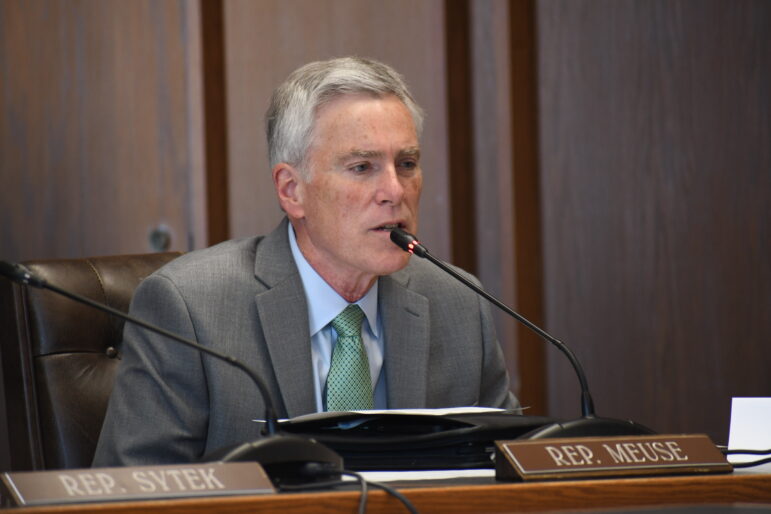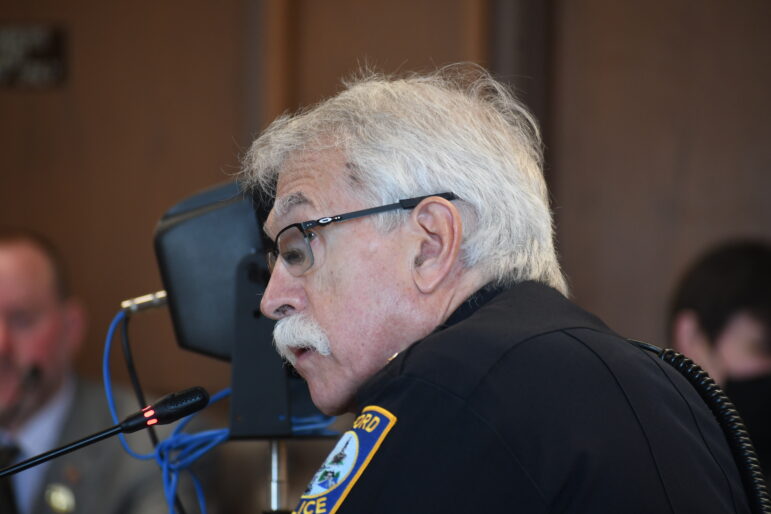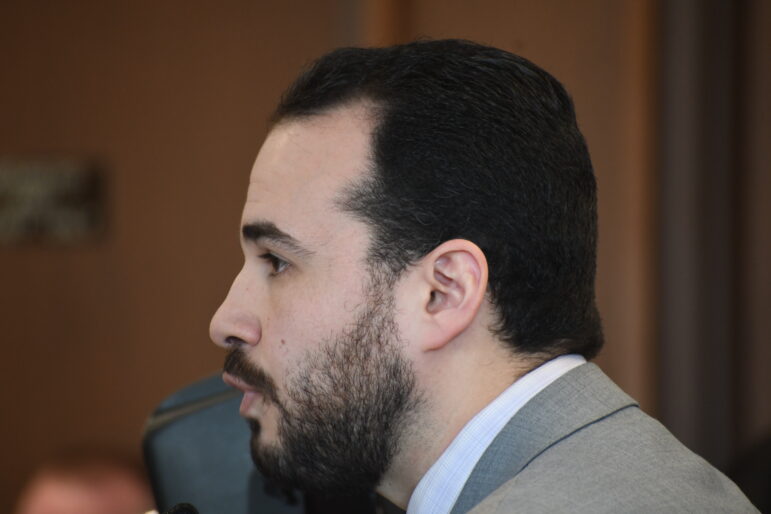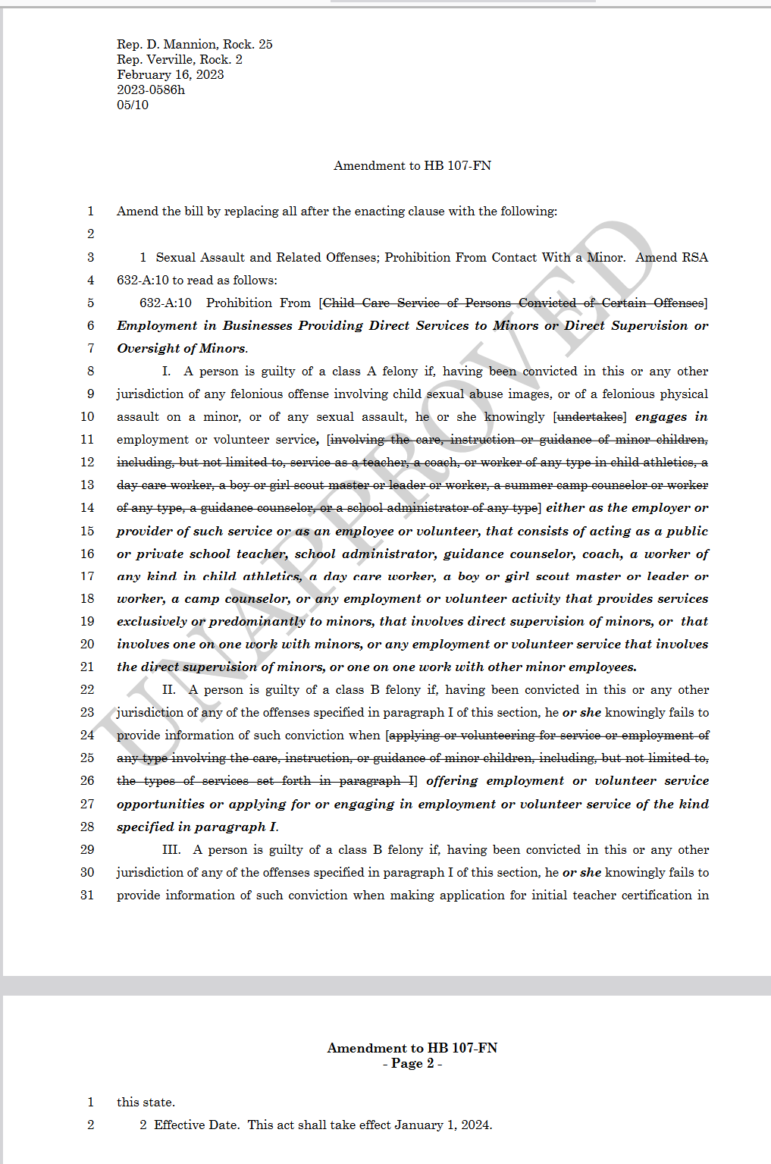The New Hampshire House of Representatives Criminal Justice and Public Safety Committee met on Friday. Here is a recap of what they discussed.

Work Session
These two bills address the legalization of fentanyl test strips by removing stand-alone penalties related to drug paraphernalia, with the intent of helping those in possession of drugs know that their might be certain amounts of fentanyl within those drugs.
Currently test strips are legal for use by drug harm reduction organizations, but not the general public, although those organizations can give those strips to the general public when requested.
David Meuse (D-Portsmouth) saying HB 470 as amended does a better job of addressing the issue, although HB 287 does as well, with both bills intending to protect those testing drugs from prosecution, with the assumption that if someone knows they are in possession of a drug that might be lethal, they may decide not to use it.
He added that the U.S. Food and Drug Administration is
“If it was your kid, what would you want,” said Meuse.
Fentanyl has become the primary drug used by individuals in New Hampshire and is often mixed with other drugs.
There were concerns from Republicans on the committee that drug dealers could use language within the bill to circumvent the law by saying they were on their way to test the drugs, with later comments adding that situation could be seen legally in a comparable light to a drug takeback event.
Later testimony indicated that in those situations, law enforcement officers would also take in additional evidence that could indicate the individual’s alleged drug dealing activity, such as possession of large quantities of cash or weighing equipment in addition the packages.
Meuse also said that a large amount of packages could be seen as differently than someone with just one package.
“These are some of the judgment calls we need to be willing to make to save lives in this state,” he said.
Bedford Police Department Chief John J. Bryfonski said the New Hampshire Association of Chiefs of Police are not opposed to legalization of fentanyl test strips, only anything that make it easier for individuals to possess fentanyl, noting that two micrograms is enough to kill someone.
“We are swimming in a sea of drugs and people will use them if they are available,” he said.
There were also questions regarding references to 10 milligrams in relation to the packages. Dr. Kerry Nolte of the University of New Hampshire borrowed a baggie containing the pills of Amanda Bouldin (D-Manchester), stating that 10 milligrams of a substance within a pill can vary in size due to potency, but in this situation in reference to the size itself rather than typical sizes of pills with 10 milligrams of a substance in them.
Nolte also said that additional legal frameworks providing security for testing for drugs could provide more grant funding and more knowledge about new synthetic drugs, comparable to efforts in states like Maryland where more comprehensive testing is available.

Public Hearings
Bill sponsor Emily Phillips (R-Fremont) spoke to this bill, which allows minors to become authorized agents regarding the possession of hypodermic needles.
Phillips, who has type 1 diabetes, has taught her children to handle diabetic needles In case she needs support during an emergency. She then learned that her children can support her in an emergency under good Samaritan laws, but otherwise they cannot legally handle a syringe with certain substances in it.
Adults have been able to handle this equipment on behalf of others in New Hampshire for more than 20 years.
Josh Yokela (R-Fremont), another sponsor of the bill, said that other states are focusing on the drugs themselves rather than paraphernalia.
The bill also had a hearing in the House Health, Human Services and Elderly Affairs Committee.
Executive Sessions
HB 287
Chair Terry Roy felt this bill was clean, and said he would like his children to have testing strips at their disposal, echoing Meuse’s earlier comments.
Vice Chair Jennifer Rhodes (R-Winchester) said she would support the bill given its intent to save lives, but she also said it wouldn’t help get fentanyl off the streets and she is concerned with people feeling it is okay to do drugs.
John Sytek (R-Salem) also said he would support the bill, but felt it was irresponsible to say that the war on drugs is not winnable.
An ought-to-pass (OTP) motion was recommended 20-0. Robin Vogt (D-Portsmouth) and Heath Howard (D-Strafford) filled in for Loren Selig (D-Durham) and Jonah Wheeler (D-Peterborough) on this and other votes during the day.

HB 470
Roy made a motion to retain the bill, asking for more work regarding potential testing facilities.
Meuse said it is important that this bill is done right and in a way that gains consensus. He added that he hopes to work on it later this year and believes it can save lives.
The retain motion passed 20-0.
HB 397
An OTP motion was made on this bill, with Roy noting that its legal already for adults and there is no reason for minors not to be authorized agents for helping adults inject drugs with supervision.
Mark Proulx (R-Manchester) was not sure if it was necessary, but felt that it was important to help prevent minors from being prosecuted just for helping others. However, he later changed his mind after Jonathan Stone (R-Claremont) said that judges would not likely sentence minors under the current law that this bill seeks to eliminate.
Linda Harriott-Gathright (D-Nashua) also said that this bill might impact situations where teenagers are using illegal drugs.
Bouldin and Howard noted that it was important to prevent criminal prosecution against minors whenever possible and schools can discipline students unnecessarily at times in response to drug-related accusations, even in well-intentioned situations such as this.
An OTP motion was recommended 14-6. While Proulx changed his mind and supported the recommendation, the recommendation was opposed by Stone, Harriott-Gathright, Meuse, Kevin Pratt (R-Raymond), Amy Bradley (D-Manchester) and Nancy Murphy (D-Merrimack.)
This bill limits the ability of local law enforcement agencies to cooperate with federal law enforcement agencies on enforcing certain gun laws.
An inexpedient to legislate (ITL) motion was recommended, 20-0.
This bill exempts gun manufacturers from federal law for guns that are manufactured within New Hampshire and never leave New Hampshire.
There were some members of the committee who said that the primary purpose of the bill related to taxes, although Meuse stated that courts would likely say that the proposed language in the bill is unconstitutional.
Meuse also expressed concern relating to manufacturers in China making guns they say are made in New Hampshire.
“There are a lot of reasons to slow down on this one,” he said.
Stone mentioned a bill in Texas with a similar intent that went much farther, with Bouldin noting after that bill passed it made it more difficult for gun manufacturers to engage in out-of-state sales.
Sytek said while he is concerned about government overreach, this bill was meaningless.
An amendment to the bill was adopted 19-1. A motion to retain the bill was also passed 19-1. In both instances, only Pratt voted in opposition.

This bill addresses the employment of sex offenders, prohibiting their ability to supervise children.
Dennis Mannion (R-Salem) introduced an amendment (see below) that removed a background check requirement that was seen as onerous for employers.
Bouldin said that many businesses already do background checks if their business deals directly with children as customers and noted that in the past it has been the responsibility of the sex offender and not the employer to address this issue. She also noted that only applied to certain sex offenders.
She added that Bob Lynn (R-Windham) was on the New Hampshire Supreme Court when the case that the bill was inspired by was heard and he recommended the amendment.
The amendment was passed 20-0 and the ought-to-pass as amended (OTPA) recommendation was approved 20-0.
NOTE: Amanda Bouldin is a contributor for Manchester Ink Link.








